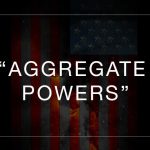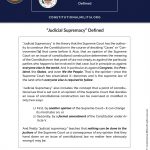Last Updated on October 5, 2021 by Constitutional Militia
This is entirely new—because, prior to NSPD-51, “[e]nduring constitutional government,” or any form of constitutional government in America for that matter, has never been “coordinated by the President.” Quite the contrary. Heretofore, although “enduring constitutional government” in the form derived from the Founders always depended upon a large measure of separation of powers and checks and balances, if any “coordinat[ion]” beyond what the Constitution originally supplied became necessary it was the province of Congress to provide it, through Congress’s exercise of the power “[t]o make all Laws which shall be necessary and proper for carrying into Execution * * * all * * * Powers vested by th[e] Constitution in the Government of the United States, or in any Department or Officer thereof.” Article I, Section 8, Clause 18. (And if Congress lacked the requisite power, the Constitution needed amendment. Article V.)
This, coupled with Congress’s powers to “establish[ ] by Law” “all other Officers of the United States, whose Appointment are not * * * otherwise provided for” in the Constitution, to “remove[ ] from Office on Impeachment * * * and Conviction” “[t]he President, Vice President, and all civil Officers of the United States,” and to require that “[t]he Judges, both of the supreme and inferior Courts, shall hold their Offices during good Behaviour” only, and coupled with the President’s duty to “take Care that the Laws be faithfully executed”, actually makes America’s “enduring constitutional government”—as mandated by the Constitution—one of Legislative, not Executive or Judicial, supremacy. See Article II, Section 2, Clause 2; Article II, Section 4; Article III, Section 1; and Article II, Section3.
NSPD-51 purports to turn this constitutional hierarchy upside down, by claiming an unprecedented power in the Executive Branch to “coordinate[ ]” “a cooperative effort among the executive, legislative, and judicial branches.” After all, in common parlance, “to coordinate” means “to bring about common action.” And “to bring about” entails more than simply “to suggest” or “to encourage.” Especially in a “national emergency,” timely and effective “coordinat[ion]” will tend to pass swiftly and sequentially from recommendation to direction, from direction to control, and thence by a short step to dictation. That this is its intention, NSPD-51 candidly admits, in its assertion that “[t]he President shall lead the activities of the Federal Government for ensuring constitutional government” (paragraph 6). For if the President “lead[s],” the other Branches of the General Government must follow. “[L]ead[ership]” allows for no separation of powers, but demands the superiority of one Branch over the others—it foresees no checks and balances among the Branches, but anticipates orders emanating from one that elicit obedience from the others. And certainly Presidential “lead[ership]” absolutely excludes Congressional supremacy.
More than that. NSPD-51 “establishes a comprehensive national policy on the continuity of Federal Government structures and operations * * * provides continuity requirements for all executive departments and agencies, and provides guidance for State, local, territorial, and tribal governments, and private sector organizations in order to ensure a comprehensive and integrated national continuity program that will enhance the credibility of our national security posture and enable a more rapid and effective response to and recovery from a national emergency” (paragraph (1)). “Guidance” is the act of “guiding.” And “guiding” means “to direct, supervise, or influence towards a particular end.” No doubt, in some instances “influence might be exercised through merely hortatory pronouncements. But “direction” and “supervision” will almost always entail compulsion. And the more severe the “national emergency” may be (or may be made to appear to be), the more stringent and coercive the Presidential “guidance” it will rationalize.
To be sure, NSPD-51(as quoted above) promises no deviation from basic constitutional principles. Once again, though, the Great Father in Washington speaks to his children with a forked tongue. For, under unilateral Presidential “coordinat[ion],” “lead[ership],” and “guidance,” who is to say what constitutes “comity with respect to the legislative and judicial branches” or what amounts to “proper respect for the constitutional separation of powers among the branches”? And who is to say whether Presidential “lead[ership]” in fact “preserve[s] the constitutional framework under which the Nation is governed and the capability of all three branches of government to execute constitutional responsibilities”? Surely the one “coordinat[ing]” and “lead[ing]” must decide—otherwise, his “coordinat[ion]” and “lead[ership]” would be open to constant interference, and could even potentially be nullified, by their subjects. Indeed, under the chaotic conditions of some “[c]atastrophic emergency,” how would “the constitutional framework under which the Nation is governed and the capability of all three branches of government to execute constitutional responsibilities” be defined, except in accordance with the “lead[ership]” the President provides? |
Of course, if Presidential “coordinat[ion]”, “lead[ership],” and “guidance” were the product of some “Law” enacted by Congress “which shall be necessary and proper for carrying into Execution * * * the Powers vested by th[e] Constitution” in the President, and which “Law” the President were “tak[ing] Care * * * be faithfully executed”, no constitutional problem would arise. For “the Laws of the United States which shall be made in Pursuance [of the Constitution]” are part of “the supreme Law of the Land.” Article VI, Clause 2. NSPD-51 is not the product of any “Law” enacted by Congress, however. It is a Presidential “directive.” But the President can exercise no legislative powers. For “[a]ll legislative Powers * * * granted [in the Constitution] shall be vested in a Congress of the United States.” Article I, Section 1. Nonetheless, through NSPD-51, the President purports to impose on Congress (and on the Judiciary as well) his own unilateral “coordinat[ion]” and “lead[ership].” The President presumes to give the “law” to the Nation’s only legitimate lawgiver.
Thus, NSPD-51 is not just another familiar, innocuous “continuity-of-government” plan, but instead contains a veritable Frankenstein’s formula for centralized, concentrated control of the General Government as a whole, “State, local, territorial, and tribal governments, and private sector organizations”—that is, the entire country—“from the top down,” with all of the levers of undefined “emergency powers” potentially in the hands of a single individual. On this canvas the President’s legal brush-wielders have painted the perfect picture of a Fuhrer state. And the advent of a Fuhrer state, of course, signals the end of popular self-government, or of popular government of any kind.
Even in a Fuhrer state, though, a Fuhrer alone will not suffice. To come to its full fruition, a Fuhrer state will always require, recruit, and reward a multitude of amoral, ruthless—and, inevitably, homicidal— followers zealous to do the Fuhrer’s will, no matter how perverse it may be. And in a Fuhrer state these operatives, civilian and military alike, will understand that their positions, powers, privileges, and possibilities for advancement derive from and depend upon the Fuhrer alone, and therefore will recognize no authority other than his, and will commit themselves as loyal and responsible solely to him. (Not for nothing, after all, was the motto of the most notorious Fuhrer’s SS, “My Loyalty Is My Honor”.) So, from implementation of NSPD-51 (or future Presidential “directives” of like ilk that it inevitably will spawn), Americans can expect a systematic degeneration—indeed, a progressive “thugification”—of the Executive Branch that will make the worst of the contemporary rogue agencies of the General Government appear to be the veriest models of due process by comparison. If the kakistocracy is bad now, just wait—“you ain’t seen nothin’ yet”!
III. What else, though, can be done to protect “the continuity of government” against true “[c]atastrophic emergenc[ies]”?
A. Something must be done, and soon, because the consolidation of a Fuhrer state in America will guarantee that “[c]atastrophic emergenc[ies]” threatening “the continuity of government” will occur again and again. Indeed, an entrenched Fuhrer state will prove itself to be the source and cause of such “[c]atastrophic emergenc[ies].” For example, the Executive Branch simply cannot go around the world blustering against, threatening, subverting, attacking, occupying, and looting other countries and expect those countries, or their peoples as individuals, not to strike back. Substituting aggression for diplomacy always incites—and often justifies—retaliation.
Even less can the Fuhrer state now emerging in this country persist in its absurd domestic fiscal and monetary policies, expecting that, when the inevitable financial crisis erupts, tens of millions of desperate Americans will meekly submit to the orders of a para-military police-state apparatus that claims to provide them with “homeland security”even while they are forced to scrounge their daily meals from garbage cans.
B. A direction entirely different from that taken in NSPD-51 must be followed, because the approach that document adopts is thoroughly unsatisfactory both in practice and in principle.
1. Even if it were otherwise unobjectionable, a Fuhrer state could never provide true “continuity of government” in practice.
True “continuity of government” entails not merely the “continuity” of the governmental apparatus and the individuals running it. The General Government is not an institution or entity separate from and superior to the American people, that serves its own and its operatives’ interests to the exclusion of the people’s. Rather, the General Government exists to serve the people, to the exclusion—and if necessary at the sacrifice—of public officials’ personal interests. The General Government is only the means; the people are the ends. As the Preamble to the Constitution emphasizes, We the People’s “domestic Tranquility,” “common defence,” “general Welfare,” and “Liberty” are the consequential matters: their lives, their freedom, their prosperity, their ability to carry on without fear—especially without fear of their own public officials.
Doubtlessly, if Providence arranged for large segments—indeed, the greater part—of the General Government’s elephantine “administrative state” to disappear tomorrow, few Americans would be any worse off, and many would very soon be much better off, than they are today. Doubtlessly, too, however, if the constitutionally legitimate segments of the General Government were thrown into discontinuity and disarray by a “[c]atastrophic emergency,” many common Americans would suffer. But that means that any proper plan for preserving “the continuity of government” must look not only to tables of bureaucratic organization and operation at the upper echelons of the General Government, so as to keep the really necessary agencies staffed, trained, and supplied, but also and especially to the means for reestablishing and maintaining the “continuity” of ordinary Americans’ lives in the face of any foreseeable national calamity.
Any truly “[c]atastrophic emergency” will create massive economic and social dislocations over wide areas, affecting huge numbers of people. To deal with its effects will require “rational economic calculation:” that is, identifying and allocating the correct amounts of scarce resources to mutually competing ends on a timely and efficient basis. Rational economic calculation under the central bureaucratic planning of a Fuhrer state, though, is a contradiction in terms. Indeed, even in tranquil times, let alone in a major “national emergency,” the absence of free markets for determining the prices of essential goods and services renders rational economic calculation well-nigh impossible.
In any “[c]atastrophic emergency,” the fundamental problems will be: to find out what has gone wrong; to identify what needs to be accomplished in order to correct the situation; to determine what personnel, equipment, and other resources are available to do the job; to specify how, when, and by whom it should be done; and then to perform the necessary work under proper supervision. This process will require accurate and timely information. Information that can be gleaned only on the spot. Indeed, information that will have to be created on the spot by people intimately familiar with the Local situation. Success in such an endeavor will therefore require subsidiarity; decentralization of power and responsibility; recruitment, mobilization, organization, and deployment of forces “from the bottom up;” and reliance on the common sense and patriotism of ordinary Americans—to use the constitutional concept, “federalism.” Not Fuhrerism. In such circumstances, Fuhrerism will prove to be a recipe for cooking up immediate chaos and serving up ultimate disaster.
2. Even if “continuity of government” “coordinated by the President” in the fashion of NSPD-51 might accidentally work in practice here and there (in the same way that Mussolini made the trains run on time in Fascist Italy), in political principle it remains undesirable always and everywhere.
The process of maintaining “the continuity of government” could prove to be worse than useless, unless the right people, with the proper intentions, remained firmly in control of it at all times. For, in the confusion of a “[c]atastrophic emergency,” those who directed the process, if their motives were malicious, could avail themselves of the opportunity in order to transform the government’s very nature in the guise of maintaining its “continuity.” Under the Constitution, We the People should control whatever process aims at preserving “the continuity of government,” because We the People should always remain responsible for and capable of safeguarding their own government’s essential nature. That, after all, is what self-government necessarily entails. For part 3 click below.



































